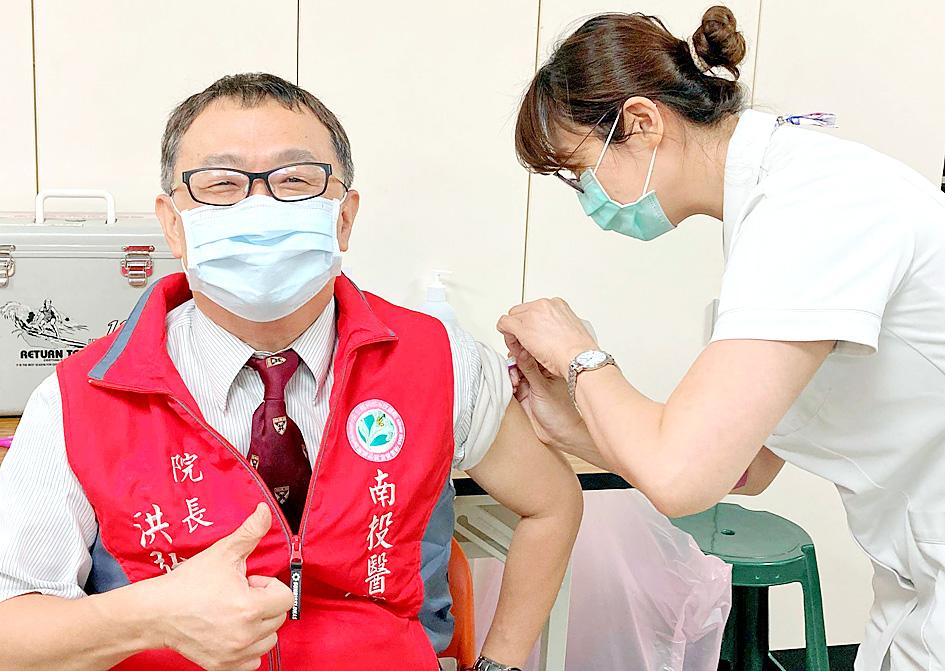Four deaths have been reported to the vaccine adverse event reporting system this year, the Centers for Disease Control (CDC) said yesterday, but added that its advisory specialist panel considered the causes to be associated with underlying health conditions, so the government’s flu vaccination program would continue.
CDC Deputy Director-General Chuang Jen-hsiang (莊人祥) said that an Advisory Committee on Immunization Practices and Vaccine Injury Compensation Program meeting was held on Monday evening to discuss the death of dozens of people in South Korea following the beginning of a seasonal flu vaccination program there.
The meeting also discussed several serious adverse events in people who received flu shots in Taiwan, after the government-funded flu vaccination program began on Oct. 5, he said.

Photo: Hsieh Chieh-yu, Taipei Times
Chuang said 76 claims of flu vaccine adverse events had been reported to the adverse event reporting system as of Monday, including 25 serious cases, 13 of whom involved prolonged hospital stay, life-threatening conditions or death.
The symptoms of the 13 serious cases included myocarditis, cellulitis, shock, difficulty breathing, acute myocardial infraction (heart attack), subarachnoid hemorrhage and acute cerebrovascular event (stroke), the CDC said.
People who claimed to have mild vaccine adverse events reported symptoms including dizziness, a headache, skin rashes, swollen skin and a fever, but the majority of them have recovered, it said.
Among the 13 serious cases, four people have died after receiving a flu shot, CDC physician Tsou Tsung-pei (鄒宗珮) said, adding that they were aged from 62 to 77, and died within three to 10 days after getting vaccinated.
She said three of them had received a flu shot manufactured by French pharmaceutical company Sanofi, but not from the same batch, and one received a shot made by local vaccine maker Adimmune Corp (國光生物科技).
The people were asked in advance if they had experienced serious adverse reactions after receiving a flu shot in the past, and whether they had a fever or a moderate or severe illness that should delay the vaccination, she said.
Tsou said the four died of cardiovascular events, including cerebral hemorrhage and myocardial infarction, and that the advisory specialists considered the events to be more likely caused by the individuals’ underlying health conditions, rather than adverse reactions to the flu vaccination.
Chuang said the specialists at the meeting also suggested that the CDC continue with the flu vaccination program, while closely following up on reported vaccine adverse events.
South Korean authorities have said the deaths there were not linked to flu vaccination and the nation’s vaccination program would continue, he said.
While Singapore has temporarily halted the use of two types of flu vaccines as a precaution, other countries have continued with their flu vaccination programs.
Tsou said the specialists think the benefits of continuing with the flu vaccination program outweigh the risks, as the vaccine adverse event claims were sporadic, not clustered, and the people did not receive vaccines from the same batch or experience similar symptoms.

A decision to describe a Chinese Ministry of Foreign Affairs statement on Singapore’s Taiwan policy as “erroneous” was made because the city-state has its own “one China policy” and has not followed Beijing’s “one China principle,” Deputy Minister of Foreign Affairs Tien Chung-kwang (田中光) said yesterday. It has been a longstanding practice for the People’s Republic of China (PRC) to speak on other countries’ behalf concerning Taiwan, Tien said. The latest example was a statement issued by the PRC after a meeting between Singaporean Prime Minister Lawrence Wong (黃循財) and Chinese President Xi Jinping (習近平) on the sidelines of the APEC summit

Taiwan’s passport ranked 34th in the world, with access to 141 visa-free destinations, according to the latest update to the Henley Passport Index released today. The index put together by Henley & Partners ranks 199 passports globally based on the number of destinations holders can access without a visa out of 227, and is updated monthly. The 141 visa-free destinations for Taiwanese passport holders are a slight decrease from last year, when holders had access to 145 destinations. Botswana and Columbia are among the countries that have recently ended visa-free status for Taiwanese after “bowing to pressure from the Chinese government,” the Ministry

HEALTHCARE: Following a 2022 Constitutional Court ruling, Taiwanese traveling overseas for six months would no longer be able to suspend their insurance Measures allowing people to suspend National Health Insurance (NHI) services if they plan to leave the country for six months would be abolished starting Dec. 23, NHIA Director-General Shih Chung-liang (石崇良) said yesterday. The decision followed the Constitutional Court’s ruling in 2022 that the regulation was unconstitutional and that it would invalidate the regulation automatically unless the NHIA amended it to conform with the Constitution. The agency would amend the regulations to remove the articles and sections that allow the suspension of NHI services, and also introduce provisional clauses for those who suspended their NHI services before Dec. 23, Shih said. According to

Minister of Labor Ho Pei-shan (何佩珊) yesterday apologized after the suicide of a civil servant earlier this month and announced that a supervisor accused of workplace bullying would be demoted. On Nov. 4, a 39-year-old information analyst at the Workforce Development Agency’s (WDA) northern branch, which covers greater Taipei and Keelung, as well as Yilan, Lienchiang and Kinmen counties, was found dead in their office. WDA northern branch director Hsieh Yi-jung (謝宜容), who has been accused of involvement in workplace bullying, would be demoted to a nonsupervisory position, Ho told a news conference in Taipei. WDA Director-General Tsai Meng-liang (蔡孟良) said he would